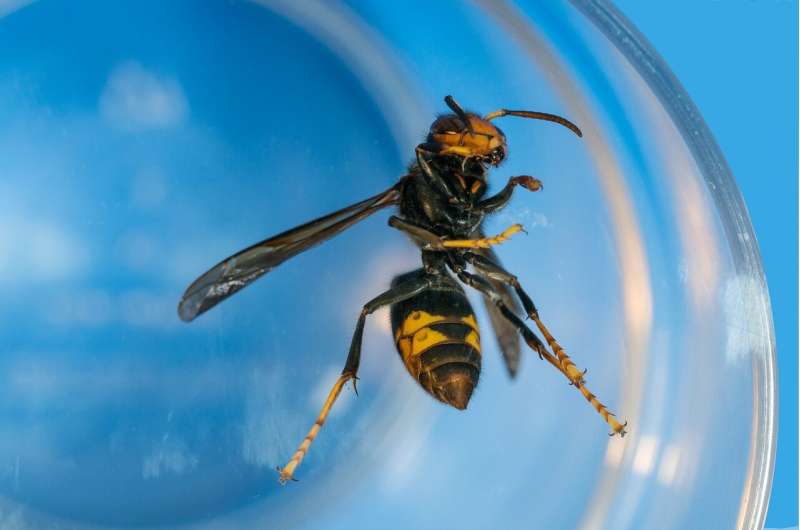This article has been reviewed according to Science X's editorial process and policies. Editors have highlighted the following attributes while ensuring the content's credibility:
fact-checked
peer-reviewed publication
trusted source
proofread
Team of international experts call for urgent action against increasing threat from invasive species

While invasive alien species have long been recognized as a major threat to nature and people, urgent action now is needed to tackle this global issue. This is the critical evaluation by the 88 authors, representing 101 organizations from 47 countries, of "Curbing the major and growing threats from invasive alien species is urgent and achievable" published in Nature Ecology & Evolution, including lead author Professor Helen Roy from the UK Center for Ecology & Hydrology and the University of Exeter.
Focused on the main findings of the Intergovernmental Science Policy Platform on Biodiversity and Ecosystem Services (IPBES) thematic assessment report on invasive alien species and their control, the paper also highlights that the impacts of invasive alien species observed today are likely to underestimate the magnitude of future impacts. Also, the interactions among biodiversity drivers are key as no driver acts in isolation.
Co-chair of the IPBES IAS assessment and lead author, Professor Helen Roy from the UKCEH and the University of Exeter, said, "The paper brought together the entire expert team of the IAS assessment, with this diverse group spanning many disciplines with perspectives from around the world drawing the same conclusion about the need for urgent action on the major and growing threat of invasive alien species.
"With the number of invasive alien species set to rise, the IPBES invasive alien species assessment provides the evidence-base and options to inform immediate and ongoing action. To achieve this there is a need for collaboration, communication and cooperation, not only across borders but within countries."
Professor Peter Stoett from Ontario Tech University, co-chair of the IPBES IAS assessment, added, "Interdisciplinarity is key to the success of IPBES assessments. It was wonderful to see social science and humanities experts interacting with invasion biologists and other natural scientists, in a community-building process that will inform policy decisions moving forward."
The threats posed by invasive alien species are expected to continue to rise. Every year, approximately two hundred new alien species are now being introduced globally by human activities to regions they had not been recorded before.
Even without the introduction of new species by human activities, already established alien species will continue to naturally expand their geographic ranges and spread into new countries and regions, with many causing negative impacts. Simple extrapolations from the impacts of invasive alien species observed today are likely to underestimate the magnitude of future impacts.
Interactions among drivers of biodiversity loss are amplifying biological invasions with no driver acting in isolation. Climate change is a major driver facilitating the establishment and spread of invasive alien species into previously inhospitable regions. For example, climate warming is enabling aquatic and terrestrial invasive alien species to establish and spread poleward, including into the Arctic and Antarctic regions.
Also, in some mountainous regions, climate change, acting together with other drivers of biodiversity loss, has allowed invasive alien species to extend their ranges into higher elevations twice as fast as native species.
The IPBES invasive species assessment provided the first comprehensive synthesis of evidence globally concluding that the threat of biological invasions is major but can be mitigated with urgent cross-sectorial cooperative and collaborative action.
Co-developing management actions with multiple stakeholders including government and private sector stakeholders, and Indigenous Peoples and local communities will be critical to achieving success in addressing biological invasions.
Aníbal Pauchard, co-chair of the IPBES IAS assessment and Professor at the University of Concepción, Chile, says, "This is not only the most comprehensive global assessment on invasive alien species to date, but also the selection of experts and the evidence gathering was done under the highest standards of inclusivity, resulting in a report which provides critical insights for all stakeholders."
Coordinating bodies such as the Non-Native Species Secretariat can ensure effective collaboration among diverse stakeholder groups. Indeed, management actions in response to incursions of the Asian hornet (Vespa velutina) in the UK have involved multiple stakeholders coming together to ensure rapid flow of information following detection of the species leading to effective control of nests.
The paper recognizes that the engagement of the general public through awareness raising campaigns, education and community science platforms also contributes to establishing shared responsibilities in managing biological invasions. Community science initiatives, supported by digital identification tools are important for the rapid detection of invasive alien species.
Records submitted by the public through the Asian Hornet Watch app in the UK are making a major contribution to Vespa velutina (Asian hornet) early warning and rapid response.
More information: Helen Roy et al. Curbing the major and growing threats from invasive alien species is urgent and achievable', Nature Ecology & Evolution (2024). DOI: 10.1038/s41559-024-02412-w. www.nature.com/articles/s41559-024-02412-w
Journal information: Nature Ecology & Evolution
Provided by UK Centre for Ecology & Hydrology




















